Explore the Richness of Tourism in Dubai Today
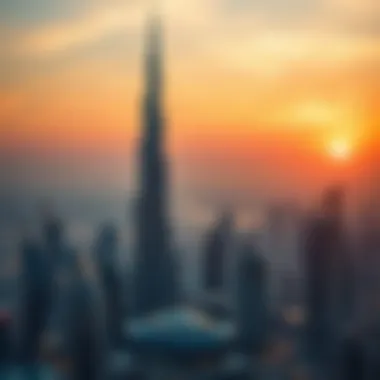
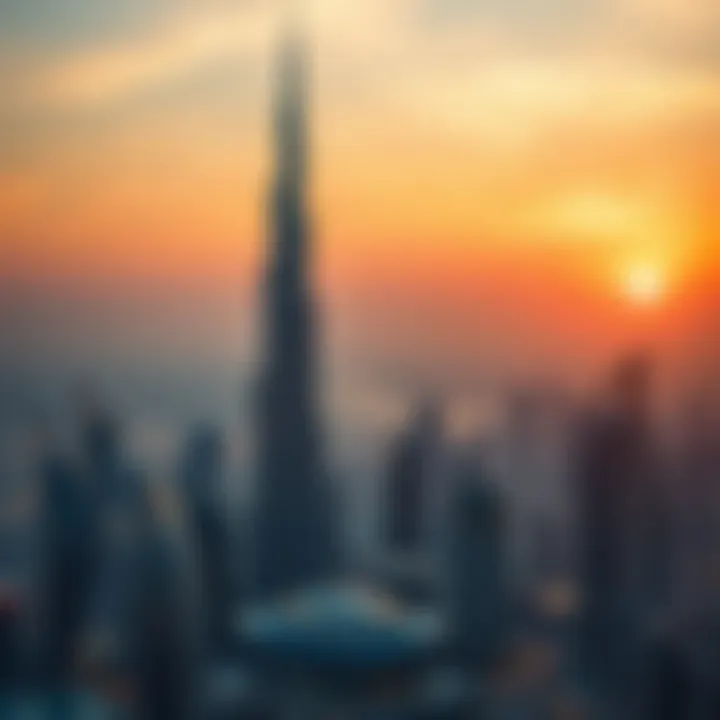
Market Insights
The tourism sector in Dubai is not just an ancillary part of its economy; it’s the beating heart of the city. Over recent years, the landscape of tourism has dramatically evolved, reflecting trends in consumer behavior and showcasing the city’s unwavering ambition to be a premier global destination.
Current Trends in Dubai Real Estate
Amidst the vibrant tourism scene, the real estate market in Dubai has undergone significant transformations. Short-term rentals have gained traction, largely driven by the influx of tourists seeking unique experiences. Airbnbs and vacation homes are popping up like daisies, allowing investors to tap into a lucrative niche.
The demand is fueled by travelers who prefer homely comforts over conventional hotel stays. It’s quite the sight to see high-rises with scenic views rented out for days, with visitors reveling in the luxury of space. Moreover, initiatives from the Dubai government have rolled out incentives for investors, making property purchase a sweet deal.
Predicted Market Growth and Future Opportunities
Looking ahead, analysts suggest that the real estate market will continue to bloom. The Expo 2020 outcome laid a solid foundation, and as travel restrictions ease, more international visitors are expected.
“Dubai is a city that thrives on future foresight, continually reshaping its landscape to cater to tourists and investors alike.” The trends clearly indicate a burgeoning market with plenty of areas ripe for investment. Expect more mega developments to spring up, creating buzz among expatriates and seasoned investors alike.
Investors should watch out for community-centric projects. This is where the future of real estate is headed; developers are focusing more on creating integrated neighborhoods with access to leisure facilities, shopping hubs and cultural experiences.
Investment Strategies
Venturing into Dubai’s real estate market can be both exciting and daunting. Here are some strategic tips to pave your way toward smart investments.
Tips for First-Time Buyers
- Research is Key: Understand the market dynamics and area-specific trends. Knowledge is power, and knowing where to invest is crucial.
- Consider Off-Plan Properties: Investing in developments before bricks meet mortar can save you a chunk of change. However, ensure the developer has a good track record.
- Understand the Legal Landscape: Familiarize yourself with property laws. Some areas are designated for foreign ownership, while others are not.
- Budget for All Costs: Beyond just the purchase price, account for maintenance, property management fees, and service charges.
Analyzing High-Potential Investment Areas
Finding the right location can feel like searching for a needle in a haystack, but there are some neighborhoods gaining traction deserving attention:
- Dubai Marina: Ideal for short-term rentals with its stunning views and vibrant lifestyle.
- Downtown Dubai: Home to the Burj Khalifa and an ever-growing business hub.
- Jumeirah Village Circle (JVC): Offers affordability without compromising on access to amenities.
Diving into the pulse of tourism in Dubai reveals boundless opportunities. With the dual focus on cultural experiences and economic expansion, this city proves to be an attractive prospect for both travelers desiring unique experiences and investors seeking robust returns. Keep an eye on market trends and align your strategies accordingly for fruitful ventures.
Overview of Dubai's Tourism Industry
Dubai has carved a niche for itself as a prime destination for travelers from all corners of the globe. The tourism industry in this city is not merely a sector; it's the lifeblood that powers various other aspects of the economy and society. This industry contributes significantly to job creation, infrastructure development, and cultural exchange. It serves as a gateway for understanding the unique blend of tradition and modernity that Dubai offers.
Historical Context
To comprehend the current state of Dubai's tourism, it’s vital to look back at its roots. Once a modest fishing village, Dubai's journey from the late 20th century onward showcases an ambitious transformation. The discovery of oil in the 1960s brought unprecedented wealth, paving the way for urban development.
In the late 1980s, Dubai’s leaders envisioned tourism as a key component of economic diversification. They invested heavily in infrastructures, such as hotels and attractions, to draw in tourists. The hosting of major events like the Dubai Shopping Festival in 1996 marked the city’s first significant push toward becoming a tourism juggernaut.
Today, the historical context enriches the tourism experience, with museums and heritage sites coexisting with skyscrapers and luxury shopping.
Current Trends
Fast forward to today, and the tourism landscape is continually evolving. Recent trends reflect a surge in adventure tourism, cultural experiences, and sustainable travel options. For instance, more travelers now seek authentic experiences that connect them with local traditions and communities. This demand has led to a proliferation of activities such as desert safaris and cultural tours through places like the Al Fahidi Historic District.
Additionally, technology plays a central role in reshaping how visitors engage with the city. From augmented reality apps guiding tourists through historical sites to enhanced online booking systems, the convenience factor is soaring. Social media influencers are also reshaping perceptions and trends, showcasing hidden gems that were not on the tourist radar before.
Economic Impact
The economic ramifications of Dubai's tourism industry are profound. Tourism contributes a staggering percentage—over 10%—to the city’s GDP, creating jobs for a considerable portion of its population.
"A robust tourism sector means economic resilience, job creation, and cultural diplomacy."
Hotels, retail, transportation, and entertainment are just a few sectors that thrive on the influx of visitors. The establishment of the Dubai Tourism Strategy aims to attract 25 million visitors per year by 2025, ensuring that investments into areas like infrastructure and promotional campaigns continue to grow. The ripple effects extend beyond immediate revenue, creating ancillary services and boosting local businesses.
Overall, as one examines the landscape of tourism in Dubai, it's evident that it’s a dynamic tableau shaped by its history, current trends, and substantial economic impact. Understanding this context is crucial for anyone looking to engage with the city's tourism sector—be it travelers, investors, or real estate enthusiasts.
Iconic Landmarks
When one thinks of Dubai, vibrant imagery of striking skyscrapers, breathtaking beaches, and cultural landmarks come to mind. Iconic landmarks are not only the heart and soul of Dubai's skyline; they also define its tourism character. These sites enhance Dubai's reputation as a global destination, drawing millions of visitors each year who wish to witness firsthand the blend of modern architecture with rich heritage. Each landmark tells a unique story and offers distinct experiences, making them essential stops for any traveler or investor looking to understand the city’s essence and its market potential.
Burj Khalifa
Standing tall at 828 meters, the Burj Khalifa is a triumph of architectural innovation. It dominates the skyline and serves as a symbol of the ambition and determination of Dubai's rapid development. Visitors flock to the observation decks on the 124th and 148th floors not just for the panoramic views but also for the experience itself. The journey in the high-speed elevator, shooting up at breathtaking speeds, is an adrenaline rush in itself.
The Burj Khalifa is much more than a building; it's a beacon of tourism. Hosting events such as the spectacular light shows and the New Year's Eve fireworks display, it reinforces Dubai's image as a hub of entertainment.
"The Burj Khalifa has become a yardstick of modern architecture, pushing boundaries and redefining global standards."
However, there's also a practical perspective that investors should consider. With its prime location at the heart of downtown Dubai, it has increased the desirability of real estate in the surrounding areas. Thus, properties near this landmark often see higher demand and value appreciation.
Dubai Mall
Just a stone's throw from the Burj Khalifa, Dubai Mall is the largest shopping center in the world by total area. Beyond its sheer size, it boasts over 1,200 retail outlets, including luxury brands and flagship stores. The mall offers more than just shopping; it features a wide array of entertainment options, such as the Dubai Aquarium and Underwater Zoo, an ice rink, and even a virtual reality park.
With a footfall in the millions, Dubai Mall serves as a central hub for social and recreational activities. Visitors are enveloped by the luxury experience not just in shopping but also in dining, with countless eateries catering to every palate. It’s a place where tourists and locals mingle, making it a great opportunity for investors to tap into the bustling retail and entertainment sectors.
From an investment standpoint, retail spaces in or near the mall can be incredibly lucrative given the high volume of visitors it attracts.
Palm Jumeirah
Palm Jumeirah represents luxury living on a grand scale. This artificial island, shaped like a palm tree, is a testament to human ingenuity and an engineering marvel. It is lined with opulent resorts, upscale restaurants, and beachfront properties that draw both tourists and expats looking for a taste of lavish lifestyle.
The allure of Palm Jumeirah lies not just in its beauty. The island is home to several high-end hotels, including the iconic Atlantis, which offers a unique underwater experience with its Aquaventure Waterpark. This attracts families and thrill-seekers alike. Visitors often enjoy various activities from sunbathing on pristine beaches to fine dining with stunning views of the Arabian Gulf.
For investors, Palm Jumeirah continues to be a hotspot for property investment. The area sees constant growth in prices, which speaks to the steady demand for luxury and vacation homes. Additionally, the unique nature of the development means properties here often command premium rental prices throughout the year.
In summary, the iconic landmarks of Dubai serve various roles. They are integral to the city's cultural identity, draw tourists, impact local economies, and offer vast opportunities in real estate investment. Each landmark provides insight into the multifaceted nature of life in Dubai, serving as vital touchstones for those seeking to navigate the landscape of tourism and investment in this dynamic city.
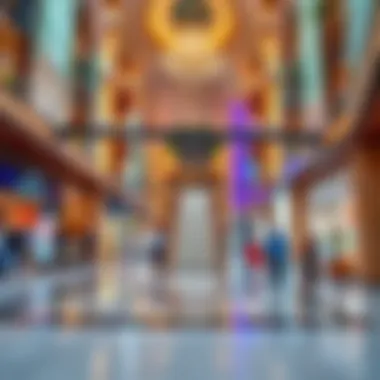
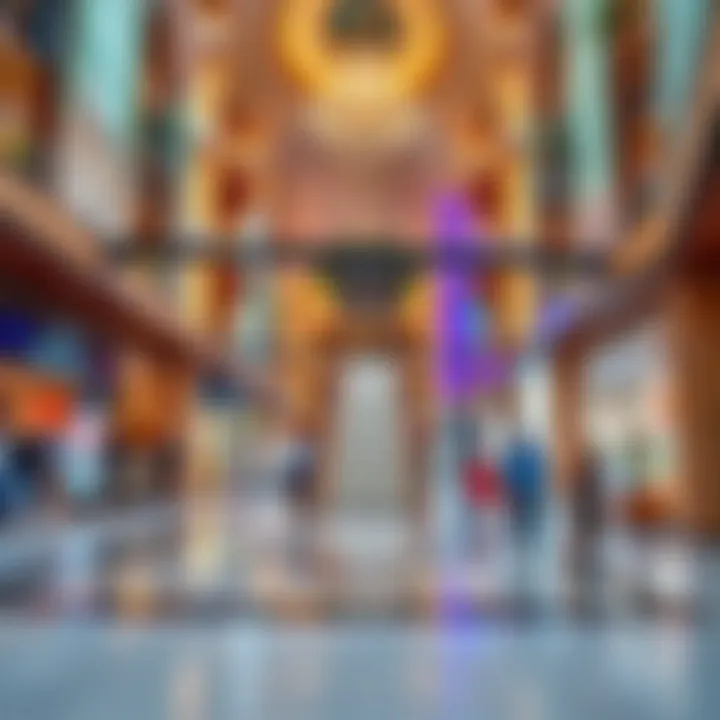
Cultural Experiences
Cultural experiences in Dubai are not just a mere add-on; they are the backbone of what makes this city thrive as a dynamic destination for tourists and investors alike. Embracing culture goes beyond visiting the Burj Khalifa or shopping in luxury malls. It involves a deep dive into the traditions, flavors, and arts that shape the life of its inhabitants. For those looking to invest or just visit, observing and understanding these cultural nuances can provide invaluable insight into the local way of life. Here’s a closer look at three essential segments of Dubai's cultural tapestry: traditional markets, culinary delights, and art and museums.
Traditional Markets
Traditional markets, or souks, are a crucial thread in the fabric of Dubai’s history and culture. These bustling marketplaces invite visitors to step into a world where the past meets the present. One can wander through the Gold Souk and marvel at the dazzling array of jewelry that has kept its charm over the years. The Spice Souk offers a sensory experience with its rich aromas and vibrant colors, making you feel as if you’ve been transported to another time.
- Local Insight: Bargaining is an art here; don’t be shy to negotiate prices, as it’s part of the shopping ethos.
- Apart from shopping, these stalls often serve as social hubs, where locals and tourists alike blend together, sharing stories over cups of aromatic coffee.
Culinary Delights
Dubai's culinary landscape reflects its multicultural roots, offering a smorgasbord of flavors from around the world. Dining here is not just about the food; it’s an experience wrapped in hospitality. From street-side vendors to high-end restaurants, each meal tells a story.
- One can indulge in traditional Emirati dishes like Al Harees, a wheat and meat dish, or explore diverse cuisines like Indian, Persian, and Filipino.
- Food festivals pop up throughout the year, highlighting the city's dedication to culinary innovation.
- Don't miss the chance to sample dishes from food trucks, which are often crowd favorites and affordably priced.
- Tip for Visitors: Always ask locals for recommendations; they often have hidden gem eateries that tourists wouldn’t usually stumble upon.
Art and Museums
Art in Dubai transcends traditional boundaries, celebrating both contemporary works and historical exhibitions. The Dubai Opera is a masterpiece itself, hosting programs that range from opera to ballet. Beyond performing arts, the city is home to innovative art galleries like Alserkal Avenue, where regional talents exhibit their work.
- The Dubai Museum is another vital stop, tracing the city’s rapid transformation from a fishing village to a global metropolis.
- Art initiatives and exhibitions often showcase the works of emerging artists, offering a platform for cultural dialogue and exchange.
Investing time in Dubai's art scene can open doors to understanding its diverse community and future development trends, making it a strategy that might benefit investors or expatriates greatly.
In summary, engaging with cultural experiences in Dubai offers a rich, immersive way to connect with the city. Whether it’s through shopping in souks, savoring local dishes, or exploring art, each cultural facet serves not only as a unique attraction but also as a glimpse into the soul of the city. For those considering putting down roots or investing in this vibrant place, these experiences provide a solid foundation for understanding its multifaceted identity.
Adventurous Activities
In Dubai, the thrill of adventure is ever-present, making it a top destination for tourists seeking not only relaxation but also adrenaline-fueled experiences. The opportunities for engaging in various adventurous activities play an essential role in shaping the overall appeal of this vibrant city. From vast deserts to sparkling waters, Dubai offers something for everyone eager to embark on a heart-pounding journey.
Desert Safaris
Desert safaris are a quintessential part of experiencing Dubai's majestic landscapes. Tourists often find themselves captivated by the golden dunes and serene vistas that seem to stretch endlessly. Options for desert safaris vary widely—there's camel riding for those who prefer a more traditional route, while others may opt for high-octane dune bashing in a 4x4 vehicle.
The cultural experience that comes with a desert safari is equally enticing. Travelers often partake in activities like henna painting or trying their hand at falconry, both small but meaningful interactions with local traditions. Evenings can be magical, as many tour operators organize dinner under the stars—a chance to savor authentic Emirati cuisine accompanied by traditional music and dancing.
"The desert has a way of teaching us, showing us our place in the vastness of nature, and reconnecting us with simplicity."
Water Sports
With Dubai's stunning coastline, water sports provide a refreshing way to enjoy both the sea and the sun. From jet skiing along the iconic Palm Jumeirah to parasailing over the azure waves, the options are abundant. The thrill-seekers are sure to kick their experience up a notch with activities like flyboarding or wakeboarding—giving the feel of flying over water.
Moreover, for those who are more inclined towards the tranquil side, snorkeling and diving excursions open a gateway to explore the rich marine life beneath the surface. Sites like the Dubai Aquarium offer not just a peek at the underwater world but also provide an opportunity to get acquainted with marine conservation efforts.
Theme Parks
Dubai is a playground for all ages, which is evident from its diverse range of theme parks. Whether it’s the record-breaking rides at IMG Worlds of Adventure or the immersive experiences at Motiongate, there’s something for every thrill level.
Families often flock to Aquaventure Waterpark, where giant water slides complement long, lazy river rides. Each park has its unique charm, often blending cutting-edge technology with storytelling to engage visitors from the moment they arrive.
The combination of entertainment and adventure creates a lasting impression, inspiring repeat visits not just from local residents but also international tourists.
End
In summary, the adventurous activities in Dubai add a layer of excitement that resonates with a variety of travelers, making the city an attractive destination. The rich offerings in desert safaris, thrilling water sports, and engaging theme parks cater to every taste, creating memorable experiences that blend culture and adventure. For investors and travelers alike, recognizing the significance of these elements is crucial to understanding the broader tourism picture in Dubai.
Accommodation Options
When it comes to exploring a city as dynamic as Dubai, the accommodation options play a pivotal role in shaping the experience of visitors. Not only does the choice of stay impact convenience and comfort, it dictates the overall accessibility to attractions, the ambiance of the visit, and even financial budget considerations. Given Dubai’s robust tourism industry, travelers are faced with a plethora of choices ranging from opulent hotels to affordable lodgings.
Luxury Hotels
Staying in luxury hotels in Dubai is something often considered a rite of passage for many. The city boasts an impressive portfolio of high-end establishments that cater to those seeking unparalleled comfort and opulence. Hotels like the Burj Al Arab redefine luxury with their extravagant amenities, while Ritz-Carlton offers a seamless blend of elegance and world-class service.
- Unmatched Experience: Luxury hotels tend to offer more than just a place to sleep. Guests can enjoy world-class spas, gourmet dining, and stunning views of the skyline. A stay in one of these hotels often translates to experiences curated to perfection, like private beach access or exclusive tours.
- Networking Opportunities: For expatriates or investors, these luxurious settings serve as melting pots of diverse cultures and connections, offering the chance to network with likeminded individuals.
- Location: Many high-end hotels are strategically located near main attractions, making it easy to explore places like the Dubai Fountain and Dubai Mall without breaking a sweat.
However, it’s wise to note that the cost can be substantial, and securing advanced reservations often becomes essential, especially during peak tourist seasons.
Budget-Friendly Stays
Budget-conscious travelers need not sacrifice comfort for cost. Dubai has an array of budget-friendly accommodations that allow tourists to enjoy the city without draining their wallets. Options like Ibis Hotels and local guesthouses can provide clean, convenient stays at phenomenal rates.
- Accessibility: Many budget hotels are located near metro stations, ensuring easy access to major tourist spots.
- Cultural Immersion: Choosing local guesthouses or smaller hotels offers a chance to interact with residents, getting a more intimate feel of the local lifestyle.
- Essential Amenities: Despite being budget-friendly, many of these accommodations offer essential amenities like free Wi-Fi, breakfast, and even laundry services.
Staying economically ensures you have more funds to spend on experiences like dining and excursions rather than on accommodation.
Short-Term Rentals
Short-term rentals have surged in popularity, providing travelers with a home-away-from-home feel. Platforms such as Airbnb and local services have made it easier for tourists to find unique spaces ranging from stylish apartments to quaint villas.
- Flexibility: Rentals can offer more space and flexibility than traditional hotel room stays, particularly useful for families or groups traveling together.
- Local Feel: Renting a home brings the opportunity to experience Dubai as a resident would, allowing visitors to shop in local markets and prepare their own meals, adding to the authenticity of the journey.
- Cost-Effective for Groups: For larger groups or families, homes might prove more economical when shared costs are considered compared to multiple hotel rooms.
However, it is advisable to check reviews and the legitimacy of listings beforehand to avoid any potential pitfalls.
Whether you're looking to indulge in extravagant luxury, travel on a budget, or immerse yourself in local culture through rentals, exploring various accommodation options in Dubai ensures that there’s something for everyone, catering to diverse preferences and financial plans. The perfect stay can significantly enhance your visit, leading to unforgettable memories in this dazzling city.
"Accomodation is not just about the roof over your head; it is the foundation for all experiences your journey can offer."
For more detailed accommodation insights, you can read further at Trip Advisor or explore more options on Airbnb for unique stays.
Transportation Infrastructure
The transportation infrastructure in Dubai plays a crucial role in shaping the tourism experience and enhancing the overall accessibility of the city. Efficient transport options are vital not only for visitors exploring attractions but also for businesses and residents navigating the urban landscape. The strategic investment in various modes of transportation underscores Dubai’s commitment to maintaining its status as a leading global city.
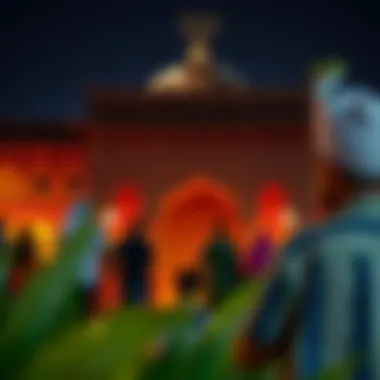

Public Transport
Dubai's public transport system has grown significantly, catering to the needs of millions of residents and tourists alike. The backbone of this system is the Dubai Metro, which is one of the longest driverless metro systems in the world. It operates two main lines—Red and Green—covering essential areas, including tourist hotspots like the Burj Khalifa, Dubai Mall, and Dubai Marina.
- Affordability: One of the main draws of the public transport system is its affordability. A single journey costs relatively little, ensuring that tourists can save money while exploring the city.
- Connectivity: The network connects seamlessly with buses, monorails, and water buses, making it easy to transfer between different modes of transport. This connectivity enhances the efficiency of moving around the city.
- Cleanliness and Safety: Public transport in Dubai is known for its cleanliness and safety. The trains and buses are well-maintained, showing a commitment to customer satisfaction.
Travelers wishing to use public transport should consider purchasing a NOL card, which applies to metro, buses, and water transport, adding to the overall convenience of getting around.
Taxis and Ridesharing
Taxis are a popular choice among tourists, offering door-to-door service and flexibility. The blue and white taxis, which are metered, are widely available throughout the city and can be flagged down or booked via phone. Some advantages include:
- Availability: Taxis are generally easy to find, especially around major landmarks or hotels. However, during peak hours, wait times can increase.
- Comfort: Taxis provide air-conditioned interiors, ensuring a comfortable ride, particularly in Dubai’s hot climate.
- Ridesharing Convenience: In addition to traditional taxis, ridesharing apps like Uber and Careem operate extensively. These platforms provide an alternative for those who prefer a digital booking experience, often allowing for fare transparency and payment options that suit the users.
The ease of utilizing both taxis and ridesharing makes them an attractive option for both short trips and longer distances across the city.
Car Rentals
For those looking for complete freedom and flexibility, renting a car in Dubai can be an excellent option. Several reputable car rental services are available, catering to varying budgets and vehicle preferences. Here are key considerations:
- Diverse Choices: From economy cars to luxury vehicles, visitors can find a rental option that matches their needs. Popular options include brands like Toyota, BMW, and Mercedes.
- Road Infrastructure: Dubai boasts well-maintained roads, with clear signage in both Arabic and English. This makes driving efficient and straightforward for visitors.
- Parking Facilities: Most tourist attractions and shopping malls have ample parking, often at reasonable rates, minimizing the worry of securing a spot.
Tip: Remember, driving is on the right side of the road, and having an international driving permit (IDP) is necessary for tourists wishing to drive in Dubai.
In essence, the transportation infrastructure of Dubai enhances the overall experience for visitors, making it easier for them to explore all that this vibrant city has to offer.
Shopping in Dubai
Shopping in Dubai is not just a leisure activity; it’s a vital part of the city's cultural, social, and economic fabric. The blend of traditional marketplaces and modern commercial centers makes Dubai a shopper's paradise. It caters to diverse preferences, whether one is hunting for high-end fashion, local handicrafts, or unique souvenirs. Tourists and residents alike find themselves immersed in an exhilarating shopping experience that complements the city’s lavish lifestyle and vibrant culture.
Malls vs. Souks
Dubai boasts a striking contrast between its grand malls and traditional souks.
- Malls, like the Dubai Mall and Mall of the Emirates, are modern wonders filled with international brands, restaurants, and entertainment options such as indoor ski slopes and aquariums. These vast spaces offer an air-conditioned escape from the desert heat, making shopping accessible and comfortable. Visitors can conveniently find everything from electronics to haute couture under one roof.
- Souks, on the other hand, offer a glimpse into the rich cultural heritage of Dubai. The Gold Souk and Spice Souk await with vibrant stalls filled with local treasures. The hustle and bustle, along with the aroma of spices, create an authentic experience. Haggling is part of the game here, allowing patrons to engage in the art of negotiation, adding a personal touch to each purchase.
The experience of shopping in a souk can feel more like a treasure hunt, where every corner offers something unique. In this way, each shopping outing can become a story, unlike the largely uniform experience in malls.
Luxury Brands
Dubai is a beacon for luxury shopping, attracting high-end brands from around the globe.
- Storefronts of Chanel, Gucci, Louis Vuitton, and more line the aisles of luxurious malls like The Dubai Mall, making it a playground for fashion enthusiasts. The unique architectural design and luxurious interiors add opulence to the shopping experience.
- The annual Dubai Shopping Festival, a celebration of discounts and deals, further enhances its appeal. The festival attracts millions, offering everything from exclusive collections to celebrity appearances, making it a highlight in the shopping calendar.
For investors, the luxury market in Dubai continues to thrive, driven by a rising affluent population and strong tourism. The presence of luxury brands not only boosts retail sales but also supports the real estate market, as those with high disposable incomes often seek luxury properties.
Local Crafts
Shopping in Dubai isn’t solely centered around luxury; it also embraces and promotes local craftsmanship.
- Artisans contribute to the rich tapestry of local culture with handmade carpets, pottery, and textiles that often reflect the traditions of the UAE.
- Places like the Al Fahidi Historical Neighborhood showcase galleries and shops where tourists can purchase genuine Emirati crafts. The craftsmanship involved creates unique items that can't be found anywhere else, enriching the shopping experience.
- Supporting local craftsmen through purchases not only preserves traditional art forms but also provides an opportunity to engage with the culture on a deeper level.
This blend of local charm and global luxury makes Dubai a unique shopping destination. While the luxurious exterior might catch one’s eye, it is often the local crafts that leave a lasting impression and connect visitors to the heart of Dubai’s heritage.
"In Dubai, shopping transcends mere necessity; it weaves into the very essence of the city's dynamic identity, reflecting its history, culture, and aspirations."
This multifaceted shopping experience, from luxury brands to local crafts, offers both tourists and potential investors insights into the opportunities in Dubai's tourism landscape. When visiting or looking to invest, understanding this unique shopping culture can enhance engagement and lead to a richer experience.
Safety and Regulations for Tourists
When traveling, understanding safety and regulations is vital. It’s about knowing the lay of the land—what you can and cannot do, and how to keep yourself secure. For tourists venturing into Dubai, a city renowned for its lavish lifestyle and vibrant culture, being informed on these matters is essential to ensure a smooth experience.
Local Laws
Navigating Dubai's laws can be a bit like walking on a tightrope. The city has strict regulations shaped by its Islamic cultural foundation. For instance, public displays of affection are frowned upon, and issues like alcohol consumption are tightly controlled. Here are some specific laws tourists should be aware of:
- Public Conduct: It’s best to keep your voice down and maintain a respectful demeanor in public spaces. Shouting or using offensive language could land you in hot water.
- Drugs: Possession of drugs, no matter how small the quantity, can lead to severe penalties, including imprisonment.
- Dress Code: While Dubai is more liberal compared to other emirates, modest dress is expected, particularly in religious places like mosques. Women, in particular, should consider covering their shoulders and knees.
"Understanding local laws is not just about avoiding fines; it's about respecting a culture that is pivotal to Dubai's identity."
Health Guidelines
With global concerns over health, particularly in travel, Dubai has put forth guidelines to protect both residents and tourists. Adhering to these is critical, especially during flu seasons or health crises like the COVID-19 pandemic. Here’s what to consider:
- Vaccinations: Ensure you're up-to-date with routine vaccinations. Some vaccines might be recommended depending on your origination country.
- Health Insurance: Visitors should obtain travel health insurance that covers emergency medical services.
- Hygiene Practices: Basic hygiene measures, such as regular hand washing or using hand sanitizers, are advised to minimize illnesses.
Emergency Contacts
Preparation is key, and knowing who to call in case of an emergency can save lives. In Dubai, the emergency numbers are as follows:
- Police: 999
- Ambulance: 998
- Fire Department: 997
It's wise to have these numbers saved in your phone. Moreover, many hotels provide safety instructions and detailed contacts at the front desk. In addition, the Dubai Police have a user-friendly app available for tourists, offering essential information on safety.
Real Estate Opportunities
Investing in real estate in Dubai is not just a fleeting fancy; it’s a solid avenue for those seeking financial growth while tapping into one of the world’s most dynamic markets. This section delves into the various aspects, benefits, and considerations surrounding real estate opportunities in the emirate, providing a clear picture for potential investors.
Property Investment
Dubai boasts a unique property market, distinguished by its diverse options ranging from luxury villas in gated communities to sleek apartments in high-rises. Investing in property here can be likened to holding a golden ticket—one that opens doors to lucrative rental yields and capital appreciation.
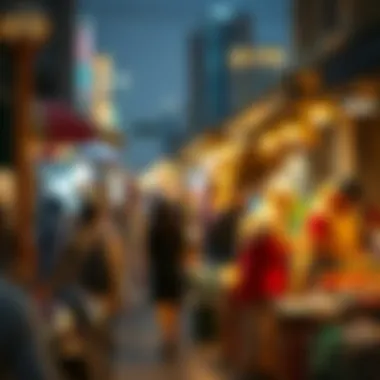
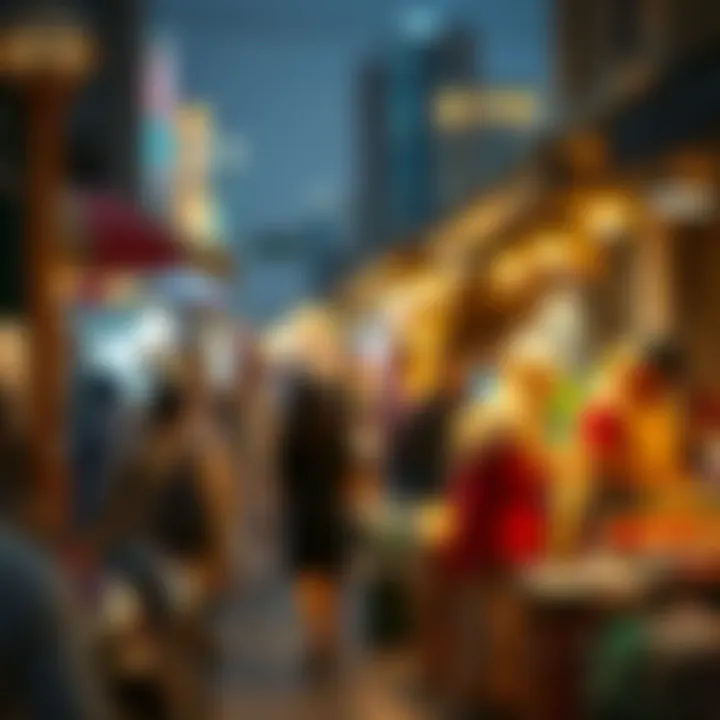
But what exactly makes property investment in Dubai worthwhile? The city’s strategic geographical location, stable political climate, and robust economic growth are key ingredients that contribute to its allure. Moreover, with the continuous influx of expatriates and tourists, the demand for housing remains consistently high, ensuring that property remains a valuable asset.
When considering property investment, it’s vital to keep in mind the regulatory framework. For instance, some areas allow 100% foreign ownership, while others may require a local partner. Moreover, potential buyers should be aware of the various fees associated with real estate transactions, including registration fees and maintenance costs.
"Dubai's property market is not just about space; it's about lifestyle, accessibility, and an ever-evolving infrastructure that appeals to residents and investors alike."
Short-Term Rentals for Tourists
With the tourism sector booming, short-term rentals have quickly become an attractive investment option. The increasing number of visitors looking for alternatives to hotels has created a ripe market for platforms like Airbnb and Vrbo. Investors can capitalize on this trend by purchasing or renting out properties specifically for short-term stays.
These rentals often yield higher returns compared to traditional long-term leases, especially in high-demand areas like Dubai Marina or Downtown Dubai. However, prospective landlords must navigate local regulations. In some cases, licensing and adherence to cleanliness standards are imperative to avoid penalties.
Key considerations when diving into short-term rentals include:
- Location: Aim for tourist hotspots that guarantee foot traffic.
- Amenities: Properties equipped with pools, gyms, and proximity to public transport often attract more bookings.
- Maintenance: Regular upkeep is crucial to maintain guest satisfaction and positive reviews.
Market Trends
Understanding market trends is essential for any investor looking to make informed decisions. In recent years, the Dubai real estate market has shown a pattern of resilience and adaptability. Notable trends can be summarized as follows:
- Price Adjustments: After a few years of steady decline, property prices have shown signs of recovery, making it an opportune moment for buyers.
- Diversification of Offerings: Developers are focusing on projects that cater to a broader audience, including affordable housing projects alongside luxurious developments.
- Smart City Initiatives: The government's push towards smart city innovations is reshaping the urban landscape, further enhancing property values due to improved infrastructure and services.
To stay ahead of the game, potential investors should consistently research and observe these trends, as they can greatly influence buying and selling decisions.
In summary, Dubai offers a treasure trove of real estate opportunities for those willing to delve into its intricacies. By understanding the nuances of property investment, recognizing the potential of short-term rentals, and being aware of market trends, investors can make strategic moves that pay off over time.
Future Developments in Tourism
Understanding the future developments in Dubai’s tourism sector is like peeking into a crystal ball. With its transformative approach towards tourism, the city is always on the cutting edge. As trends and expectations evolve, so does Dubai’s strategy, making it a beacon for visitors and investors alike.
New Attractions
Dubai is not resting on its laurels. While landmarks like the Burj Khalifa and the Dubai Mall are renowned, the city is continually introducing new attractions to maintain its allure. The upcoming Dubai Creek Tower, set to eclipse the height of the Burj Khalifa, is one such project generating buzz. With picturesque views over the creek and innovative architecture, it embodies Dubai's ambition to redefine skyline luxury.
There's also the Dubai Solar Park, which aims at being a hub of sustainability. This green initiative is not just an attraction but a vital step towards reducing the carbon footprint and promoting eco-tourism. And how about the Museum of the Future? Slated to open soon, this marvel focuses on innovation and technology, providing immersive experiences that draw on Dubai’s future vision.
- Why New Attractions Matter:
- Attracts Diverse Visitors: New projects cater to various interests, ensuring a broader visitor base.
- Economic Boost: More attractions mean more jobs and increased revenue for the local economy.
- Reinforces Dubai's Brand: Continuous innovation strengthens Dubai's image as a top-tier tourist destination.
Sustainability Initiatives
Sustainability is high on the agenda. With significant attention on global warming and environmental issues, Dubai is adopting measures that enhance both the tourist experience and its ecological footprint. The government's commitment to green tourism is evident through initiatives like the Dubai Sustainable Tourism framework. This initiative aims to promote sustainable practices within the hospitality sector while still providing high-quality experiences for tourists.
Moreover, the World Expo 2020 pushed Dubai towards a sustainable path, focusing on areas such as resource conservation and environmentally friendly practices. Hotels are now incorporating solar energy and water-saving technologies.
"Sustainability isn’t just a buzzword; it’s a commitment that Dubai is embracing wholeheartedly in its tourism narrative."
- Key Elements of Dubai’s Sustainability Push:
- Green Building Regulations: Encouraging eco-friendly construction.
- Waste Management Programs: Reducing landfill waste through recycling initiatives.
- Eco-Tours: Promoting tours that highlight Dubai’s natural landscapes and heritage.
Government Policies Affecting Tourism
The role of government policies cannot be overstated. The government is incredibly supportive of the tourism industry. Policies are crafted not just to boost tourism, but also to ensure its sustainability. For instance, the Tourism Vision 2020 aimed to increase visitor numbers by 20 million by emphasizing cultural experiences, shopping, and hospitality.
Additionally, visa regulations have become more tourist-friendly, encouraging longer stays and easy access for travelers from various countries. These changes have a direct impact on tourism growth, fostering an environment of inclusivity and diversity.
- Benefits of Proactive Government Policies:
- Simplified Processes: Easing visa restrictions helps attract more visitors.
- Safety Regulations: Ensuring tourist safety builds trust and confidence.
- Investment Incentives: Policies that encourage foreign investment lead to better infrastructure and services.
Understanding these future developments not only offers a glimpse into what visitors can expect, but also reflects on the broader implications for investors and stakeholders looking to navigate the landscape of Dubai's expanding tourism sector.
Visitor Tips
When traversing the diverse landscape of Dubai, understanding essential visitor tips can substantially enhance one’s experience. The intricate blend of modernity and tradition in the city demands not just awareness but also respect for cultural nuances. This section provides critical insights ensuring that tourists not only enjoy their trips but also navigate the socio-cultural environment thoughtfully.
Best Times to Visit
Dubai's climate plays a significant role in determining when to visit. The peak tourist season generally extends from November to April, offering pleasant weather and numerous festivals. Temperatures during this period hover between 20°C to 30°C, making it ideal for outdoor exploration and activities.
Conversely, the summer months, particularly between June and September, see sweltering heat, reaching upwards of 45°C. This might deter many from outdoor excursions, yet it presents opportunities for excellent deals on hotels and attractions since tourist numbers dip.
Benefits of Season Selection:
- Milder Weather: Comfortable evenings ideal for dining al fresco.
- Festivals and Events: Access to cultural festivals, including Diwali and the Dubai Shopping Festival.
- Pricing: Off-season rates can lead to significant savings on accommodations and experiences.
"Timing is everything. Choose wisely, and it can lead to remarkable experiences!"
Cultural Etiquette
Deep-rooted traditions and customs shape the sociocultural framework of Dubai. Familiarizing oneself with local etiquette is vital to avoid misunderstandings. For example, modest dress is encouraged, especially in public areas and places of worship. Tourists should also be aware of local laws regarding behavior in public places; showing affection can be frowned upon.
Respecting the month of Ramadan is crucial if visiting during this period; eating, drinking, or smoking in public during daylight hours is prohibited. Instead of feeling inconvenienced, visitors can appreciate the serene atmosphere that emerges with evenings of communal breaking fast—
Key Points on Cultural Etiquette:
- Dress Code: Be mindful; cover shoulders and knees in public.
- Photography: Always ask for permission, especially in cultural or private settings.
- Social Gatherings: When invited, accepting hospitality is greatly valued.
Practical Packing Tips
Packing smart can sure save a traveler a lot of hassle. Given the diverse activities Dubai offers—from desert safaris to visiting luxurious malls—strategizing what to bring is essential. Lightweight clothing, including breathable fabrics, is advisable for daytime exploring in the sunnier months. However, for evenings, a light jacket can be handy as many indoor venues keep the air conditioning on high.
Other Essentials:
- Power Adapter: The UAE uses the Type G power socket, so travelers will need an adapter.
- Comfortable Footwear: With shopping and sightseeing, prepare for quite a bit of walking.
- Sunscreen: Protect your skin from the intense sun, especially if venturing outdoors.
Ultimately, being prepared enhances the trip experience immensely. Travelers who pay attention to when they visit, how they behave, and what they carry are likely to have a richer and more respectful experience in this dynamic metropolis.







